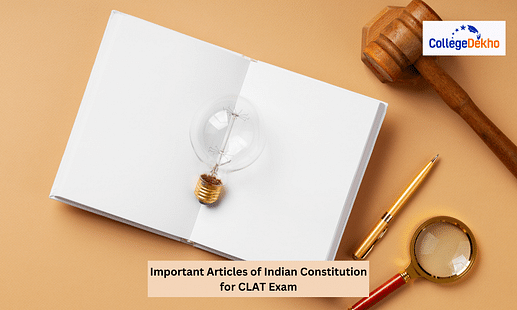
The important articles of the Indian constitution for CLAT 2025 exam should not be underestimated by any aspirant hoping to succeed in the examination. CLAT is the most popular
law entrance exam
to get into most of the renowned law schools in India and the knowledge of constitutional law is a must to ace it. The Indian Constitution is the longest written constitution in the world with 448 articles describing the structure of the government, rights, and responsibilities of people.
For the
CLAT 2025 exam
, it is essential to focus on the key articles that are frequently asked in the test. These include the articles on the rights of citizens (Articles 12-35), the form of the government and the procedure for amending the Constitution (Article 368). Besides, it is crucial to discuss landmark amendments which are significant in light of the country's legal system.
The national level law exam can be quite challenging, yet candidates can improve their odds of performing well by improving their legal reasoning skills by analysing the Important Articles of the Indian Constitution for CLAT 2025 exam which are required to answer constitutional laws based questions.
Also Read:
Criminal Law in CLAT PG 2025
Important Articles of Indian Constitution for CLAT 2025 Exam
India has the largest constitution in the world having 448 articles comprising 25 parts and 12 schedules. Therefore, while one does not have to memorise all the articles, it is vital to at least have knowledge of some of the articles for CLAT. Here are some of the most important articles of Indian constitution for CLAT 2025 Exam to focus on:
Preamble
The preamble provides the outline for some of the major principles and objectives of the Indian constitution, which includes:
- Justice (Rights which encompasses social, economic, and political justice)
- Area of freedom (of thought, expression, belief, faith, and worship)
- Gender equality (equality in rights as well as chances irrespective of gender)
- Fraternity (promoting the sanctity of the person, and the unity and integrity of the Nation)
Fundamental Rights (Articles 12-35)
The Indian constitution guarantees its citizens six fundamental rights as mentioned below:
- Right to Equality (Articles 14-18)
- Right to Freedom (Articles 19-22)
- Right against Exploitation (Articles 23-24)
- Right to Freedom of Religion (Articles 25-28)
- Cultural and Educational Rights (Articles 29-30)
- Right to Constitutional Remedies (Article 32)
Directive Principles of State Policy (Articles 36-51)
These are non-justiciable principles for the state to adhere to in its functioning. Key principles include:- Promotion of welfare of the people (Article 38)
- Equal justice and free legal aid (Article 39A)
- Uniform civil code for all citizens (Article 44)
- Right to fair and reasonable terms of employment and maternity leave conservation (Article 42)
- Maintenance and promotion of international peace and security (Article 51)
Fundamental Duties (Article 51A)
Added by the 42nd Amendment in 1976, this article lists 11 fundamental duties of citizens, such as:
- Adherence to the Constitution and recognition of the value of the Constitution
- The promotion of harmony and the spirit of fraternity among the people.
- Maintaining the diverse composite culture of our society
- Environmental conservation and enhancement
Emergency Provisions (Articles 352-360)
These articles deal with the declaration and consequences of three different types of emergencies:- National Emergency (Article 352)
- Constitutional Emergency in States (Article 356)
- Financial Emergency (Article 360)
Amendment Procedure (Article 368)
Article 368 of the Constitution describes how the Constitution may be amended. Typically, most of the amendments demand a majority in the parliament and some even require ratification from half of the state legislatures.
Judicial Review
This power of judicial review is part of the basic structure of the Constitution. The Supreme Court has the constitutional power to nullify any law or any executive action that is unconstitutional.
A few of the other crucial articles for CLAT 2025 preparation include the following:
- Citizenship (Articles 5-11)
- Parliament (Articles 79-122)
- The President (Articles 52-62)
- The Union Judiciary (Articles 124-147)
- The States (Articles 152-237)
Also Read: Important Topics for CLAT 2025 GK and Current Affairs
Why Study Important Articles of Indian Constitution for CLAT 2025?
CLAT doesn’t stop with textbook knowledge. One must have a clear knowledge of the Indian Constitution. It’s a very important part of the exam and essential for a legal career. With its structure, the Constitution forms the laws, the rights, and the State. If you focus on its important articles, you’ll have a good ground and advantage as compared to other people.It Strengthens Your Legal Basics
- Articles 14, 19, and 21 dealing with equality, freedom, and life respectively, form the basics of legal rights.
- Preparation for Article 32 enables you to understand the concept of the right to constitutional remedies.
- This will help you answer those tricky legal principle based questions in the CLAT exams with confidence.
Constitutional Law gets frequent exposure in CLAT
- Articles 15, 16, or 368 are the topics that frequently occur in multiple editions of CLAT.
- If you recognize these, you will save yourself time in the test and avoid mistakes that can be caught.
- One of the favourite cases for comprehension based questions is case law linking articles such as Kesavananda Bharati (Article 368).
Improves Analytical Skills
- Thorough studying of Article 50 (separation of powers) or 44 (Uniform Civil Code) becomes handy in assessing legislative and policy framework.
- It will naturally help you improve your reasoning skills needed in working with those very complex legal questions. Preparation of such important articles will bring you clarity in how to frame your responses.
It Connects to Everyday Lives
- Articles 23 and 24 on child labour or Article 300A on property rights are applicable in real world.
- And constitutional principles are often tested by questions connecting them to issues in society.
It Strengthens Your Scoring Potential
- Many toppers stand because they are good at analysing constitutional concepts, in particular, tricky ones.
- Focusing early on articles gives us an advantage to accurately answer legal aptitude and general knowledge questions.
Also Read: Top Law Colleges in Maharashtra Accepting CLAT 2025
The Indian constitution acts as the supreme law of India and the framework by which India operates its legal system. All the candidates who are preparing for the CLAT 2025 competition must have knowledge of the necessary articles and their relevance. Some of the most important articles for CLAT preparation are mentioned below:
- Articles 12-35: These articles provide information on the rights of Indian citizens such as the Right to equality, Right to freedom, Right to life and personal liberty among others.
- Article 32 and 226: These articles enable the Supreme Court and High Courts to enforce fundamental rights by writing. It is common to find questions relating to writs in landmark cases in the exam.
- Articles 74 and 75: The two articles in the constitution demonstrate the status and responsibilities of the Prime Minister and Council of Ministers. It is also necessary to know the specifics of the executive branch.
- Articles 121 and 211: These two articles forbid debate on the conduct of judges in the Parliament and state legislatures. It is significant for individuals to be aware that the judiciary is an independent branch of government.
- Articles 245-255: The articles contain provisions related to the legislative power of the Parliament and the state legislatures. Awareness of how powers are distributed is relevant here.
For more latest updates on CLAT 2025, stay tuned to CollegeDekho . Also, for any query head to our Q&A Zone or fill out our Common Application Form .
















Similar Articles
Mistakes to Avoid while Applying for AILET 2025
What is the Required CLAT 2025 Rank for NLSIU Bangalore Admission?
What is the Required CLAT 2025 Rank for NALSAR Hyderabad Admission?
What is the Required CLAT 2025 Rank for NLIU Bhopal Admission?
What is the Required CLAT 2025 Rank for NLU Jodhpur Admission?
What is the Required CLAT 2025 Rank for WBNUJS Kolkata Admission?